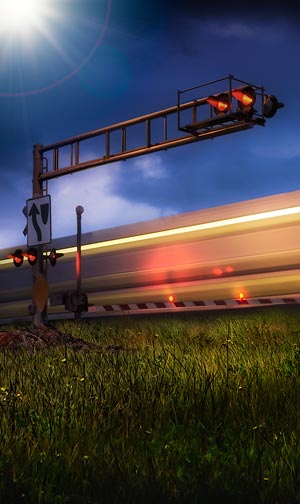Massive BNSF Train Collision Injures Four Employees, Disrupts Amarillo Area
(Amarillo, Texas – September 25, 2013)
BNSF Railway once again proved the need for a satellite-based, train-collision prevention, human error-override system Wednesday morning at about 4:30 A.M. when an eastbound BNSF train rear-ended a standing freight train, only to then have a westbound BNSF train collide seconds later with the derailed wreckage of the first two trains at the intersection of U.S. Highway 69 and FM 1912 just east of Amarillo, TX.
Four BNSF railroad employees were rushed to Northwest Texas Hospital in Amarillo, where two were admitted in critical condition, and the other two admitted with less serious injuries.
The accident occurred where BNSF’s multi-tracked main line is paralleled by U.S. Highway 69 as Farm-to-Market Road 1912 crosses the tracks via an overpass. The area of the collision and derailment, which resulted in several locomotives and as many as 30 rail cars off the tracks, is near both Highland Park High School and the Tyson Fresh Meat processing plant, but due to BNSF officials assuring public safety authorities that no hazardous materials were on board any of the three trains, there was no plan to close either facility during clean-up operations. However, some concern was expressed regarding downed power lines lying across derailed cars, and Xcel Energy line and power crews were quickly assembled to shut down all live power lines and eliminate the potential electrical hazard.
Both the Potter County Sheriff’s Office and Texas Dept. of Public Safety Highway Patrol were at the scene to handle highway traffic on both main arteries as railroad and contract derailment crews began the work of re-railing freight cars and rebuilding the torn-up tracks.
The National Transportation Safety Board announced from its headquarters in the Nation’s Capital that it would be sending a team of investigators to look into the cause and ramifications which surround the serious train wreck.
Not only had the NTSB placed the implementation of a Positive Train Control safety system, which would have prevented this as well as several other, often deadly, accidents occurring on the nation’s rail system, as the first priority item on the independent governmental transportation accident investigatory agency’s “Wish List” for 2013, but federal legislation requiring the installation of such a system by 2015 is possibly going to be shelved for another five years as the management of America’s largest railroads seeks to force Congress to delay the launch of PTC.


